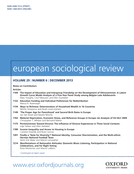-
Views
-
Cite
Cite
Jan Van Bavel, Natalie Nitsche, ‘The Proper Age for Parenthood’ and Second Birth Rates in Europe, European Sociological Review, Volume 29, Issue 6, December 2013, Pages 1149–1161, https://doi.org/10.1093/esr/jct003
Close - Share Icon Share
Abstract
Fertility differences in Europe are largely due to disparities in parity progression after the first child. Postponement is recuperated to a larger extent in countries with relatively high fertility, less in countries with very low fertility. Explanations have referred to social policy and socio-economic context. We argue that cultural factors also need to be taken into account and investigate the relationship between age norms and second birth rates in 23 European countries. Using the third round of the European Social Survey, we analyze if ideas about the ‘proper’ age for parenthood interact with actual ages at first birth in influencing second birth transitions. Our findings indicate that in regions with older ideal ages for parenthood the second birth rate is depressed for women with young ages at first birth and vice versa. This effect, however, is strongly reduced and remains only marginally significant after controlling for an interaction between regional gross domestic product (GDP) and age at first birth. This indicates that rich regions exhibit weaker postponement effects, and that this relationship largely absorbs the effect of age norms. We also find that the negative effect of high age at first birth on the second birth rates attenuates with educational attainment.



